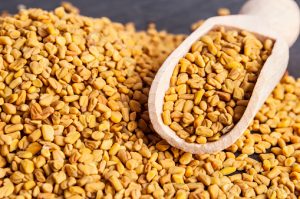 Cholesterol is like love, it can be good or bad, but it always ends up kicking your heart. And what’s even worse, there’s no 100 percent bulletproof protection against cholesterol. Some people are quite disappointed to find out that, despite avoiding all those alluring fast food joints and diligently counting their calories, their cholesterol levels still need improvement. Getting unsatisfactory blood work results time and time again can be quite discouraging, and trying out all kinds of different ways to lower cholesterol can be plain exhausting. No, we’re not going to advise you to stop exercising and watching what you eat. A healthy lifestyle has never hurt anyone. But if you feel like trying some new weapons in your fight against cholesterol, we’ve got some options. And the good news is, most of them are in your spice cabinet—or your grocery store. Give them a shot, and introduce yourself to the world of spice along the way.
Cholesterol is like love, it can be good or bad, but it always ends up kicking your heart. And what’s even worse, there’s no 100 percent bulletproof protection against cholesterol. Some people are quite disappointed to find out that, despite avoiding all those alluring fast food joints and diligently counting their calories, their cholesterol levels still need improvement. Getting unsatisfactory blood work results time and time again can be quite discouraging, and trying out all kinds of different ways to lower cholesterol can be plain exhausting. No, we’re not going to advise you to stop exercising and watching what you eat. A healthy lifestyle has never hurt anyone. But if you feel like trying some new weapons in your fight against cholesterol, we’ve got some options. And the good news is, most of them are in your spice cabinet—or your grocery store. Give them a shot, and introduce yourself to the world of spice along the way.
3 delicious remedies to lower your cholesterol
Coriander seeds. Also known as cilantro seeds, coriander gives a rich flavor to dishes when added during cooking as seeds or as a ground powder, so if you’ve never tried coriander before, introducing it to your menu is definitely going to be an interesting culinary experience. According to Ayurvedic teachings, it impacts our body’s digestion and fat absorption. Coriander seeds are known to keep cholesterol in check, thanks to the compound coriandrin, which helps lower cholesterol levels by promoting the breakdown of fats. (Discover the Italian secret now scientifically proven to help lower cholesterol.)
Advertisement
Psyllium husk. Hailed as a great source of soluble fiber (which is known for its effectiveness against nasty LDL cholesterol), psyllium husk comes from the crushed seeds of Plantago ovata, more commonly known as blonde plantain. In 1998, the FDA approved the claim that about three to twelve grams of psyllium husk fiber can help reduce your heart disease risk when consumed along with a diet low in saturated fats and cholesterol. Add one to two teaspoons of psyllium husk to your food every day to boost your soluble fiber intake and bring those stubborn cholesterol levels down.
Fenugreek seeds. Another well-known flavorful spice that also goes by the name methi, it has been used for medicinal purposes for ages. Fenugreek seeds offer antidiabetic, anti-inflammatory, and antioxidant properties, along with a good supply of vitamin E. One study out of the University of Michigan Health System has uncovered that a compound in fenugreek seeds (steroidal saponin) may work to slow down cholesterol absorption in the intestines and the rate of cholesterol production in the liver. Thanks to this compound, fenugreek seeds are also suspected to lower the absorption of triglycerides—another unwelcome guest on your blood work results—from fatty food. (You can live a fun, active life eating what you love without worrying about your heart!)
These foods may sound exotic at first, but the more you use them, the more versatile they become in your cooking. And even if you’re not a big fan of the taste, think of them as medicine. Cough syrup doesn’t always taste good either, but all that really matters is that it helps.
Related: How much cholesterol should you have a day?
